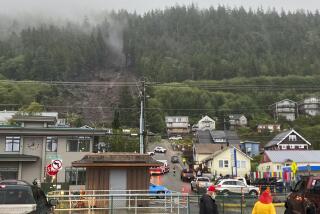Alaska’s bridge at a dead end
JUNEAU, ALASKA — Alaska on Friday officially abandoned the controversial “bridge to nowhere” project in Ketchikan that became a symbol of federal pork-barrel spending.
The $398-million bridge would have connected Ketchikan to its airport on a nearby island.
“Ketchikan desires a better way to reach the airport, but the $398-million bridge is not the answer,” Gov. Sarah Palin said in a statement.
She directed the state transportation department to find the most “fiscally responsible” alternative for access to the airport.
Republicans U.S. Sen. Ted Stevens and U.S. Rep. Don Young championed the project through Congress two years ago, securing more than $200 million in funds for the bridge between Ketchikan, on Revillagigedo Island, and Gravina Island.
A spokeswoman from Young’s office said he would have no comment. Stevens’ office did not immediately respond to requests for an interview.
Under mounting political pressure over pork projects, Congress stripped the earmark -- or stipulation -- that the money be used for the airport.
Ultimately, Congress still sent the money to the state, but for any use it deemed appropriate.
Since then, the earmark has been held up as the centerpiece example of lawmakers’ waste and poor prioritizing.
Just last month, presidential candidate Sen. John McCain (R-Ariz.) weighed in, saying pet projects could have played a role in a Minnesota bridge collapse that killed 13 people.
“Maybe if we had done it right, maybe some of that money would have gone to inspect those bridges and other bridges around the country,” McCain told a group of people in a town-hall style meeting in Ankeny, Iowa.
“Maybe the 200,000 people who cross that bridge every day would have been safer than spending $233 million of your tax dollars on a bridge in Alaska to an island with 50 people on it.”
Alaska used much of the money for other projects.
Palin on Friday said the Ketchikan project was $329 million short of full funding.
“It’s clear that Congress has little interest in spending any more money on a bridge between Ketchikan and Gravina Island,” Palin said.
“Much of the public’s attitude toward Alaska bridges is based on inaccurate portrayals of the projects here. But we need to focus on what we can do, rather than fight over what has happened,” she said.
The state’s Department of Transportation will prepare a list of projects where the $36 million in federal funds that was set aside for Gravina Island could be used.
Access to Ketchikan, as with many towns in southeast Alaska, is limited to air and water transportation.
Every flight into Gravina Island requires a 15-minute ferry ride to reach the more densely populated Revillagigedo Island from the airport’s site on Gravina Island.
Ketchikan is Alaska’s entry port for northbound cruise ships that bring more than 1 million visitors yearly.
The town -- seven blocks wide and eight miles long -- has little room to grow; it’s set against forest and mountains in the Tongass National Forest and the water.
Local leaders have said access to Gravina Island also is needed to grow the town and the economy.
So with the bridge project shelved, the state will look for a more affordable answer for Gravina Island access, Palin said.
“The original purpose of this project was to improve access to Gravina Island, and we will continue to work with the community to help them attain that goal,” transportation Commissioner Leo von Scheben said.
More to Read
Sign up for Essential California
The most important California stories and recommendations in your inbox every morning.
You may occasionally receive promotional content from the Los Angeles Times.










